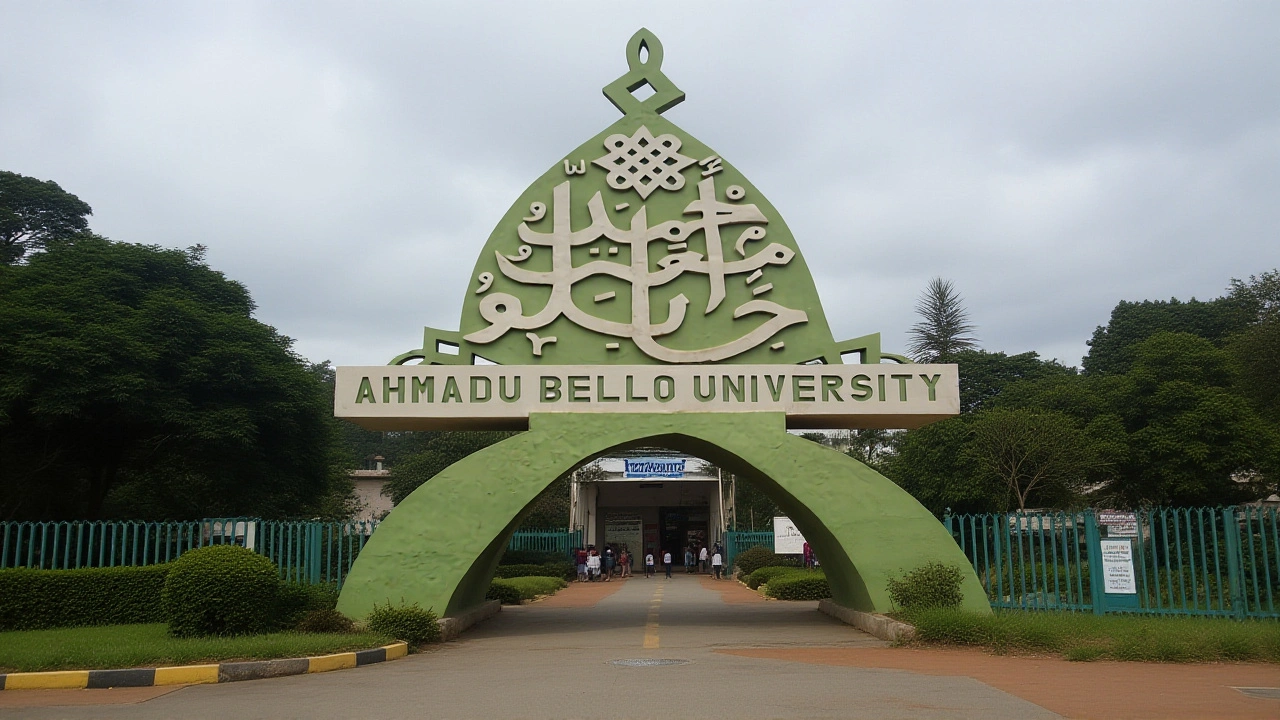When Prof. Adamu Ahmed, Vice Chancellor of Ahmadu Bello University stood at the podium of the Senate Building on the main campus in Zaria on October 4, 2025, he described the school’s yearly energy costs—nearly ₦4 billion—as "crippling and unsustainable." The 63‑year‑old institution, celebrating its anniversary, warned that the electricity bill is draining resources that could otherwise fuel research, teaching and its famed agricultural programmes.
Background: A Bill That Eats Into Budgets
ABU, the flagship university founded in 1962 by Sir Ahmadu Bello, has long been a beacon of north‑south unity in Nigeria. Yet the campus’s massive power draw—fuelled by diesel generators and an aging grid—has become a fiscal black hole. Professor Ahmed explained that the university’s operating budget is squeezed, forcing departments to cut back on field work and laboratory supplies. "When you spend almost a tenth of your total budget on electricity, you’re not feeding your students or your farms," he said.
Fiscal Impact and Current Burden
To put the figure in perspective, ABU’s total annual expenditure sits around ₦40 billion; the energy bill therefore consumes about 10 % of all spending. Compared with a similar institution in Ghana, which spends roughly ₦1.2 billion on power, ABU’s outlay is disproportionately high. The Vice Chancellor highlighted that the cost spikes each rainy season when the national grid falters, pushing the university to fire up costly diesel sets that emit both carbon and cash.
Government Intervention and Renewable Project
The federal response arrived last year when the Tertiary Education Trust Fund (TETFund) disbursed an initial ₦1 billion earmarked for emergency power. The money bought temporary generators but did little to curb the underlying dependency on fossil fuels. This week, however, the government announced a new green‑energy scheme: a 10‑megawatt renewable‑energy plant slated for ABU’s Samaru campus. The project, part of the national push to decentralise power, will be built by a consortium led by Nigerian Electricity Distribution Company (NEDC) and is expected to be operational by mid‑2026.

Alumni Initiatives and Campus Solar Efforts
Beyond the capital infusion, the university is turning to its own community for solutions. Professor Ahmed proudly mentioned the ‘SBS class of 1975’, a cohort of alumni who have already installed a solar array to power one of ABU’s computer‑based test (CBT) centres. "We’re taking our destiny into our own hands while expecting continued support from outside," he said, echoing a sentiment that resonates with many Nigerian graduates who see their alma mater as a legacy project.
Other alumni groups have pledged to fund solar panels for dormitories and lecture halls. A recent crowdfunding drive raised ₦250 million, enough to light up three hostels with rooftop PV systems. The university’s Institute for Agricultural Research (IAR) and the Faculty of Veterinary Medicine are also earmarked for pilot solar projects, given their high energy needs for labs and animal housing.
Broader Implications for Nigerian Higher Education
This energy dilemma is not unique to ABU. Across the country, universities such as the University of Lagos and Ahmadu Bello University’s sister school, Usman Daniyu University, report similar power‑poverty cycles. Energy insecurity hampers academic output, reduces the appeal for international collaborations, and forces faculty to juggle research with makeshift power management.
Experts argue that long‑term sustainability will require a blend of policy, private‑sector partnership, and grassroots innovation. Dr. Chinyere Okafor, a senior analyst at the Centre for Energy Policy in Abuja, notes, "If the federal budget continues to allocate only stop‑gap funds, institutions will remain hostage to diesel. A definitive commitment to renewable infrastructure—supported by clear feed‑in tariffs—could rewrite the story for all Nigerian campuses."

What Lies Ahead for ABU?
Looking forward, the Vice Chancellor outlined a three‑pronged roadmap: (1) accelerate the 10 MW renewable project, (2) expand alumni‑driven solar installations, and (3) embed energy‑efficiency curricula across engineering and agricultural programmes so that students become part of the solution.
In the meantime, the university’s annual report will reflect a projected 15 % reduction in its power bill by 2027, assuming the new installations meet their design goals. "It won’t be a miracle overnight," Professor Ahmed cautioned, "but it will be a step toward the self‑reliant institution Sir Ahmadu Bello envisioned—a place where knowledge, not electricity bills, powers progress."
Frequently Asked Questions
How will the 10‑megawatt renewable project affect ABU’s energy bill?
The project is expected to supply roughly 30 % of the campus’s electricity demand, cutting diesel‑generator use and saving the university an estimated ₦600 million annually, according to the university’s financial office.
What role are alumni playing in the energy transition?
Alumni groups, notably the SBS class of 1975, have funded solar installations for a CBT centre and are raising funds for additional rooftop panels. Collectively, alumni contributions could cover up to 10 % of the university’s renewable‑energy capital needs.
Why is energy cost such a critical issue for Nigerian universities?
Because most campuses rely on an unreliable national grid, they depend on diesel generators that are expensive and polluting. High electricity bills divert funds from research, staff salaries, and student services, limiting the institutions’ ability to compete globally.
What expert opinions have been offered on solving the energy crisis?
Dr. Chinyere Okafor of the Centre for Energy Policy recommends a mix of government‑backed renewable projects, private‑sector PPAs (power‑purchase agreements), and embedding energy‑efficiency training into university curricula to foster home‑grown solutions.
When is the renewable‑energy plant expected to be operational?
The federal government has slated the 10‑MW plant for commissioning by June 2026, pending final contracts and site preparation on the Samaru campus.


 Sports
Sports
vishal Hoc
October 6, 2025 AT 00:33It's good to see the university taking steps toward solar power.
vicky fachrudin
October 17, 2025 AT 14:20Indeed, the transition to renewable energy on campuses like ABU is a microcosm of the broader sustainable development goals; it reflects not only environmental responsibility but also fiscal prudence, allowing institutions to reallocate funds toward research, scholarships, and community outreach.
subhashree mohapatra
October 26, 2025 AT 19:33While the alumni initiatives are commendable, relying heavily on ad‑hoc donations can create a precarious funding model; without a robust, government‑backed strategy, the university may continue to scramble for stop‑gap solutions.
Mansi Bansal
November 6, 2025 AT 05:33i think the solar projcts could be bigger if the universty manges the budget better, maybe cut some unnecessry admin costs and put them into green tech.
ajay kumar
November 13, 2025 AT 04:13yeah, cuttin the wasteful spendings will definitely help. also, the uni can partner with local startups for cheap solar kits.
Jocelyn Garcia
November 21, 2025 AT 06:40Great to hear these efforts gaining momentum; keep pushing forward and keep the community informed – the more people see progress, the more support will follow.
pragya bharti
November 27, 2025 AT 01:33Honestly, the real game‑changer will be embedding energy studies into the curriculum; when students graduate with know‑how, they become the innovators the campus needs.
Sung Ho Paik
December 6, 2025 AT 07:47Look, the numbers are crystal clear – ₦4 billion a year is a massive drain, and the diesel generators are both costly and polluting. The new 10‑MW plant, if executed properly, could shave off at least 30% of the current demand, which translates to roughly ₦600 million saved each year. That's not just a financial win; it's an environmental mercy for the campus and the surrounding community. Moreover, alumni‑funded solar panels on dorms and lecture halls will create a distributed generation network, reducing strain on any single source. The university can also explore net‑metering agreements, allowing surplus solar electricity to be fed back into the grid, generating modest revenue. Training students in energy‑efficiency technologies will produce a generation of problem‑solvers who can replicate these solutions nationwide. By 2027, the projected 15% reduction in the power bill could free up funds for research grants, faculty hires, and modern lab equipment. The challenge now is rigorous project management – delays or cost overruns could erode the anticipated savings. Community engagement will be crucial; stakeholders must stay informed and involved, ensuring transparency and accountability. In short, this is a pivotal moment – seize it, and ABU could become a benchmark for sustainable higher education across Africa. 🌞🚀💡
Wesley Nakamatsu
December 10, 2025 AT 22:53While the optimism expressed is admirable, it overlooks the systemic inefficiencies inherent in such large‑scale projects; without stringent oversight and a realistic appraisal of logistical constraints, the anticipated fiscal relief may remain merely aspirational.
Tyler Tucker
December 17, 2025 AT 21:33What a mess – they promise savings but keep dangling promises forever!